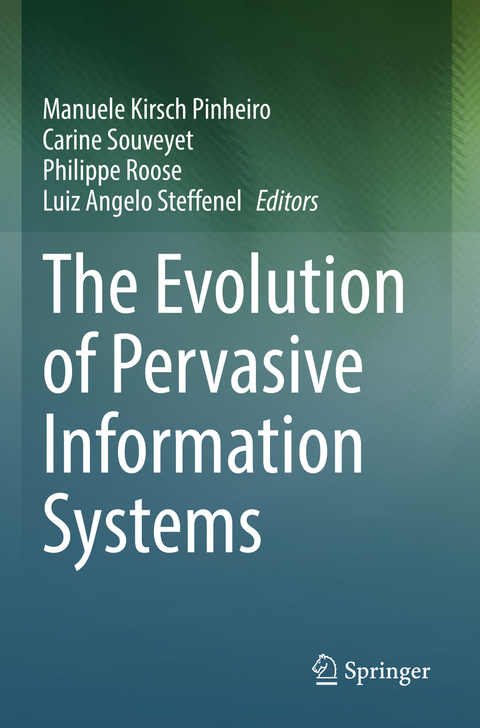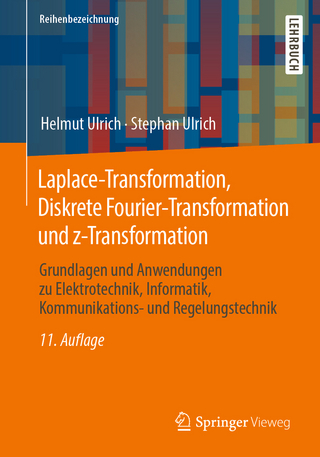
The Evolution of Pervasive Information Systems
Springer International Publishing (Verlag)
978-3-031-18178-8 (ISBN)
This book covers several aspects related the evolution of Information Systems into Pervasive Information Systems. New IT trends have an important impact on IT infrastructures, which become increasingly heterogeneous, flexible, and dynamic. These new trends are transforming Information Systems into what we call Pervasive Information Systems. The purpose of this book is to combine "state-of-the-art" solutions from various research communities (such as Information Systems Engineering, Cloud Computing, Fog/Edge Computing, Pervasive systems, Distributed systems, and Middleware systems) related to the Pervasive Information Systems emergence as a common point of view. Through these multiple contributions, this book tackles important challenges concerning Information Systems evolution, promoting a holistic view of Pervasive Information System.
Pervasive Information Systems (PIS) can be defined as a new class of Information Systems. It can be characterized by an IT that is gradually embedded in the physical environment and can accommodate the user's requirements and desires when necessary. This evolution implies considering Information Systems beyond the organization's physical environment to integrate new technologies transparently, leading to a pervasive environment whose behavior should be more and more reactive & proactive. It corresponds to an important change in Information Systems Engineering. Pervasive Information Systems are deeply multidisciplinary systems, demanding a holistic view in which multiple domains are invited to contribute.
Since September 2008, Manuele Kirsch Pinheiro is Associate Professor in the Computer Science Research Center (Centre de Recherche en Informatique) of the Université Paris 1 Panthéon Sorbonne. Previously, she occupied a post-doctoral position in Computer Science at the Katholieke Universiteit Leuven. She received her HDR (Habilitation pour Diriger les Recherches) at the Université Paris 1 Panthéon Sorbonne on 2021, and her PhD in Computer Science at the Université Joseph Fourier Grenoble I in 2006, as well as a MSC also in Computer Science at the Université Federal do Rio Grandedo Sul in 2001. Her research interests include Ubiquitous Computing, Context-aware Computing, Pervasive Information Systems, Cooperative Work (CSCW), and group awareness.Carine Souveyet has been a full professor at the University of Paris 1 Panthéon Sorbonne since 2008 and a member of the Computer Science Research Center (CRI) since 1991. Her research interests include the engineering of "Pervasive information systems" : how the engineering of traditional information systems must evolve to handle this new kind of Information system. Her academic career has also been distinguished by the awarding of the Distinction of Chevalier de l'Ordre National du Mérite by the Minister of Higher Education and Research in November 2019.Philippe Roose is associate-professor at E2S/University of Pau. He leads a bachelor in advanced computer science. He is the owner of 4 patents, two software licenses and has several experiences in technological transfers and collaborations with firms. He led several national & international projects and. He led around 20 PhD, and has more than 100 publications, mainly internationals. His research interests include Green Computing, Middleware and Context adaptation.Luiz Angelo Steffenel obtained a Ph.D. in Computer Science in 2005 at Institut National Polytechnique de Grenoble, France. In September 2007, he was recruited at Université de Reims Champagne-Ardenne, and in 2021 he was assigned Full Professor and Director of the LICIIS Laboratory. His research covers HPC, distributed computing, edge/fog computing, and Machine Learning and Deep Learning applied to domains such as biochemistry, atmospheric sciences, and smart agriculture. Among his recent projects, we can cite the H2020 AI4DI and Horizon Europe EdgeAI projects on AI applied to smartagriculture, the CAPES-Cofecub MESO project on big data and AI for atmospherical sciences, as well as the ANR E-COVISION project on COVID-19 forecasting.
Chapter. 1. What is a "Pervasive Information System" (PIS)?.- Chapter. 2. Design and Modeling in Pervasive Information Systems.- Chapter. 3. The context awareness challenges for PIS.- Chapter. 4. Middleware supporting PIS: Requirements, solutions, and challenges.- Chapter. 5. Edge Computing and Learning.- Chapter. 6. PIS: IoT & Industry 4.0 challenges.- Chapter. 7. PIS: Interoperability and Decision-Making Process - A Review.
| Erscheinungsdatum | 04.01.2024 |
|---|---|
| Zusatzinfo | X, 190 p. 24 illus., 22 illus. in color. |
| Verlagsort | Cham |
| Sprache | englisch |
| Maße | 155 x 235 mm |
| Gewicht | 317 g |
| Themenwelt | Mathematik / Informatik ► Informatik |
| Schlagworte | adaptability • context-aware computing • edge computing • Green IT • Industry 4.0 • information system • IOT • machine learning • Middleware • Pervasive Computing • Self-Adapting Systems • service oriented architecture • Systems-of- Information Systems • ubiquitous computing |
| ISBN-10 | 3-031-18178-6 / 3031181786 |
| ISBN-13 | 978-3-031-18178-8 / 9783031181788 |
| Zustand | Neuware |
| Informationen gemäß Produktsicherheitsverordnung (GPSR) | |
| Haben Sie eine Frage zum Produkt? |
aus dem Bereich


